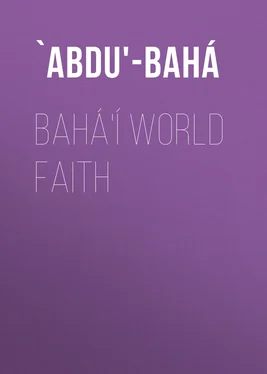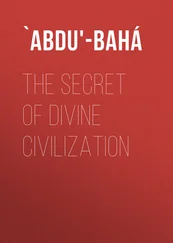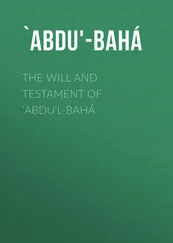`Abdu'-Bahá - Bahá'í World Faith
Здесь есть возможность читать онлайн «`Abdu'-Bahá - Bahá'í World Faith» — ознакомительный отрывок электронной книги совершенно бесплатно, а после прочтения отрывка купить полную версию. В некоторых случаях можно слушать аудио, скачать через торрент в формате fb2 и присутствует краткое содержание. Издательство: Иностранный паблик, Жанр: foreign_prose, foreign_religion, Философия, historical_fantasy, foreign_psychology, на английском языке. Описание произведения, (предисловие) а так же отзывы посетителей доступны на портале библиотеки ЛибКат.
- Название:Bahá'í World Faith
- Автор:
- Издательство:Иностранный паблик
- Жанр:
- Год:неизвестен
- ISBN:нет данных
- Рейтинг книги:5 / 5. Голосов: 1
-
Избранное:Добавить в избранное
- Отзывы:
-
Ваша оценка:
- 100
- 1
- 2
- 3
- 4
- 5
Bahá'í World Faith: краткое содержание, описание и аннотация
Предлагаем к чтению аннотацию, описание, краткое содержание или предисловие (зависит от того, что написал сам автор книги «Bahá'í World Faith»). Если вы не нашли необходимую информацию о книге — напишите в комментариях, мы постараемся отыскать её.
Bahá'í World Faith — читать онлайн ознакомительный отрывок
Ниже представлен текст книги, разбитый по страницам. Система сохранения места последней прочитанной страницы, позволяет с удобством читать онлайн бесплатно книгу «Bahá'í World Faith», без необходимости каждый раз заново искать на чём Вы остановились. Поставьте закладку, и сможете в любой момент перейти на страницу, на которой закончили чтение.
Интервал:
Закладка:
This remarkable personage was able by these principles to establish a bond of unity among the differing sects and divergent people of Írán. Those who followed His teachings no matter from what denomination or faction they came were conjoined by the ties of love, until now they cooperate and live together in peace and agreement. They are real brothers and sisters. No distinctions of class are observed among them and complete harmony prevails. Daily this bond of affinity is strengthening and their spiritual fellowship continually develops. In order to insure the progress of mankind and to establish these principles His Holiness Bahá’u’lláh suffered every ordeal and difficulty. His Holiness the Báb became a martyr, and over twenty thousand men and women sacrificed their lives for their faith. His Holiness Bahá’u’lláh was imprisoned and subjected to severe persecutions. Finally he was exiled from Írán to Mesopotamia; from Ba gh dád He was sent to Constantinople and Adrianople and from thence to the prison of Akká in Syria. Through all these ordeals He strove day and night to proclaim the oneness of humanity and promulgate the message of Universal Peace. From the prison of Akká He addressed the kings and rulers of the earth in lengthy letters summoning them to international agreement and explicitly stating that the standard of the “Most Great Peace” would surely be upraised in the world.
This has come to pass. The powers of earth cannot withstand the privileges and bestowals which God has ordained for this great and glorious century. It is a need and exigency of the time. Man can withstand anything except that which is divinely intended and indicated for the age and its requirements. Now, praise be to God! in all countries of the world, lovers of peace are to be found and these principles are being spread among mankind, especially in this country. Praise be to God! this thought is prevailing and souls are continually arising as defenders of the oneness of humanity, endeavoring to assist and establish international peace. There is no doubt that this wonderful democracy will be able to realize it and the banner of international agreement will be unfurled here to spread onward and outward among all the nations of the world. I give thanks to God that I find you imbued with such susceptibilities and lofty aspirations and I hope that you will be the means of spreading this light to all men. Thus may the Sun of Reality shine upon the east and west. The enveloping clouds shall pass away and the heat of the divine rays will dispel the mist. The reality of man shall develop and come forth as the image of God his creator. The thoughts of man shall take such upward flight that former accomplishments shall appear as the play of children;—for the ideas and beliefs of the past and the prejudices regarding race and religion have ever been lowering and destructive to human evolution. I am most hopeful that in this century these lofty thoughts shall be conducive to human welfare. Let this century be the sun of previous centuries the effulgences of which shall last forever, so that in times to come they shall glorify the twentieth century, saying the twentieth century was the century of lights, the twentieth century was the century of life, the twentieth century was the century of international peace, the twentieth century was the century of divine bestowals and the twentieth century has left traces which shall last forever.
MAN AND NATURE
From the time of the creation of Adam to this day there have been two pathways in the world of humanity; one the natural or materialistic, the other the religious or spiritual. The pathway of nature is the pathway of the animal realm. The animal acts in accordance with the requirements of nature, follows its own instincts and desires. Whatever its impulses and proclivities may be it has the liberty to gratify them; yet it is a captive of nature. It cannot deviate in the least degree from the road nature has established. It is utterly minus spiritual susceptibilities, ignorant of divine religion and without knowledge of the kingdom of God. The animal possesses no power of ideation or conscious intelligence; it is a captive of the senses and deprived of that which lies beyond them. It is subject to what the eye sees, the ear hears, the nostrils sense, the taste detects and touch reveals. These sensations are acceptable and sufficient for the animal. But that which is beyond the range of the senses, that realm of phenomena through which the conscious pathway to the kingdom of God leads, the world of spiritual susceptibilities and divine religion,—of these the animal is completely unaware, for in its highest station it is a captive of nature.
One of the strangest things witnessed is that the materialists of today are proud of their natural instincts and bondage. They state that nothing is entitled to belief and acceptance except that which is sensible or tangible. By their own statements they are captives of nature, unconscious of the spiritual world, uninformed of the divine Kingdom and unaware of heavenly bestowals. If this be a virtue the animal has attained it to a superlative degree, for the animal is absolutely ignorant of the realm of spirit and out of touch with the inner world of conscious realization. The animal would agree with the materialist in denying the existence of that which transcends the senses. If we admit that being limited to the plane of the senses is a virtue the animal is indeed more virtuous than man, for it is entirely bereft of that which lies beyond, absolutely oblivious of the kingdom of God and its traces whereas God has deposited within the human creature an illimitable power by which he can rule the world of nature.
Consider how all other phenomenal existence and beings are captives of nature. The sun, that colossal center of our solar system, the giant stars and planets, the towering mountains, the earth itself and its kingdoms of life lower than the human,—all are captives of nature except man. No other created thing can deviate in the slightest degree from obedience to natural law. The sun in its glory and greatness millions of miles away is held prisoner in its orbit of universal revolution, captive of universal natural control. Man is the ruler of nature. According to natural law and limitation he should remain upon the earth, but behold how he violates this command and soars above the mountains in aeroplanes. He sails in ships upon the surface of the ocean and dives into its depths in submarines. Man makes nature his servant; harnesses the mighty energy of electricity for instance and imprisons it in a small lamp for his uses and convenience. He speaks from the east to the west through a wire. He is able to store and preserve his voice in a phonograph. Though he is a dweller upon earth he penetrates the mysteries of starry worlds inconceivably distant. He discovers latent realities within the bosom of the earth, uncovers treasures, penetrates secrets and mysteries of the phenomenal world and brings to light that which according to nature’s jealous laws should remain hidden, unknown and unfathomable. Through an ideal inner power man brings these realities forth from the invisible plane to the visible. This is contrary to nature’s law.
It is evident therefore that man is ruler over nature’s sphere and province. Nature is inert, man is progressive. Nature has no consciousness, man is endowed with it. Nature is without volition and acts perforce whereas man possesses a mighty will. Nature is incapable of discovering mysteries or realities whereas man is especially fitted to do so. Nature is not in touch with the realm of God, man is attuned to its evidences. Nature is uninformed of God, man is conscious of Him. Man acquires divine virtues, nature is denied them. Man can voluntarily discontinue vices, nature has no power to modify the influence of its instincts. Altogether it is evident that man is more noble and superior; that in him there is an ideal power surpassing nature. He has consciousness, volition, memory, intelligent power, divine attributes and virtues of which nature is completely deprived, bereft and minus; therefore man is higher and nobler by reason of the ideal and heavenly force latent and manifest in him.
Читать дальшеИнтервал:
Закладка:
Похожие книги на «Bahá'í World Faith»
Представляем Вашему вниманию похожие книги на «Bahá'í World Faith» списком для выбора. Мы отобрали схожую по названию и смыслу литературу в надежде предоставить читателям больше вариантов отыскать новые, интересные, ещё непрочитанные произведения.
Обсуждение, отзывы о книге «Bahá'í World Faith» и просто собственные мнения читателей. Оставьте ваши комментарии, напишите, что Вы думаете о произведении, его смысле или главных героях. Укажите что конкретно понравилось, а что нет, и почему Вы так считаете.












